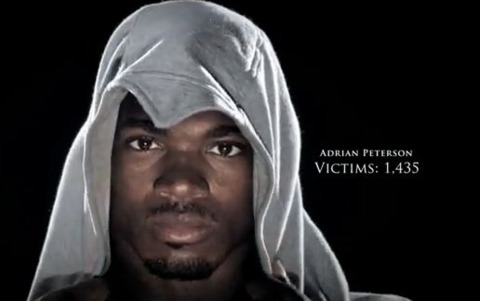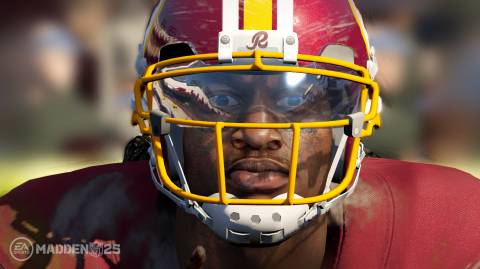Fans in Rebellion: The Link Between the NFL and the Game Industry
By thatpinguino 11 Comments
“Sports are supposed to be an escape, not a reminder of everything that’s unfair and hypocritical everywhere else.” If you interchange the world “sports” with the word “games” in that sentence, doesn’t it sound a lot like a complaint about socially conscious game coverage? Although the original sentence came from an excellent article on Roger Goodell and his continued mismanagement of the NFL, couldn’t it be readily applied to the current issues that are swirling around in the game industry? For years the target audiences of professional sports and video games have been publicly perceived as mortal enemies: videogame nerds and the jocks who abuse them. They couldn’t be any more different. The public perception is that one group dwells in man caves full of TVs, Doritos, Mtn Dew, beer, and sports paraphernalia, while the other lives in man caves full of TVs, Doritos, Mtn Dew, beer, and videogame swag … wait a second. The overlap in targeted advertising doesn’t end there; I mean, the Xbox One is the official console of the NFL for a reason. Both the game industry and the NFL have spent decades dealing escapism and fantasy to a largely white, male audience, often by selling a socially acceptable form of abstracted violence. In games, the abstraction is done through an avatar in a virtual space. The NFL instead implores its fans to identify with and live through the experiences of their favorite athletes. In each case we are meant to emotionally associate with our avatar or player of choice, yet ultimately divorce ourselves from the pain they receive or cause and from the moral questions they raise. It is all just a game, or at least it was.

Currently, the NFL and the game industry are both under increased moral scrutiny, the likes of which neither group has seen before. The NFL’s issues are largely self-inflicted black eyes. The concussion cover-up, Washington ***skins name controversy, Ray Rice debacle, bounty-gate, and annual off-season parade of arrests and suspensions have caused socially conscious viewers to wonder if the NFL is worth all of the societal problems that seem to follow the league. The former bastions of gridiron knowledge like Sunday morning pregame shows and player interviews are turning into forums for social commentary as a result. Even Phil Sims has to have a public opinion on domestic violence now. Meanwhile, in the background of all of this social saber-rattling, there is a segment of the fan-base that just wants to re-focus on the games (if you want to see those fans in the wild, just look in the comments of any socially minded football article on ESPN). Sound familiar?
While NFL coverage is largely reacting to the controversies that the league is constantly introducing, increasingly nuanced game criticism is the culprit driving the social discussion of video games. Game reviews simply are not selling the way they used to, and traditional reviewers are treading water on a sinking ship. On top of the decreased demand, the reviewers who have spent years supplying straightforward purchasing guides are now mature and skilled enough to want to write the type of critiques that occur in literally every other form of media. They want to write deep social critiques if a game warrants such a thing. They want to discuss industry wide trends and studio biases. They want to write like the critics that they read and look up to. This has introduced a schism between writers with increased authorial voices and their audience that has grown to expect “objective” reviews (which never existed because every review is predicated on a reviewer’s subjective experience, but whatever). In videogames we are also seeing a segment of the fan base rebelling against this new social commentary.

These two separate loci of fan rebellion are centered on the same issue: escapism. Football fandom and videogame playing have largely been refuges from the banality of the real world. For most fans, they are bubbles that protect from “everything that’s unfair and hypocritical everywhere else.” Thus, when journalists and critics come along pointing out why a particular escapist hobby is problematic or exclusionary, fans react by defending their hobby. They try to silence criticism that might expose the faults within their hidey-hole. Both fan bases are not used to the new discussions that are springing up, and they would really prefer if those discussions stopped. They want to just get back to the games and stay in their comfort zones. I think Charles P. Pierce says it best when he commented on the defensiveness of football fans by saying, “There are only two possible approaches to these issues. You can answer them honestly, or you can duck them entirely.” I’m afraid that too many of both groups are attempting to silence discussion, and in doing so are preventing meaningful progress. If questions like, “Why are women being forced out of the game industry?” and “Why are there convicted domestic abusers playing in the NFL right now?” don’t get answered, each of these hobbies will become even less inviting to women and drive away the women that are already a part of the fan base. If questions like, “Why are there so few protagonists of color?” and “Why is the Washington team’s name a slur?” don’t get answered, then these hobbies will do the same to some minorities. The last thing the NFL and the game industry want are consumers that are constantly questioning the morality of their own fandom. Football and videogame fandom will never reach their widest level of acceptance without engaging with these questions and finding meaningful answers. Neither the NFL nor the game industry can survive a constant critical shelling by the media and the damage that would cause to public perception. In short, dealing with increased scrutiny is only an issue if you ignore valid criticism and do not adapt. Just ask the NFL.
